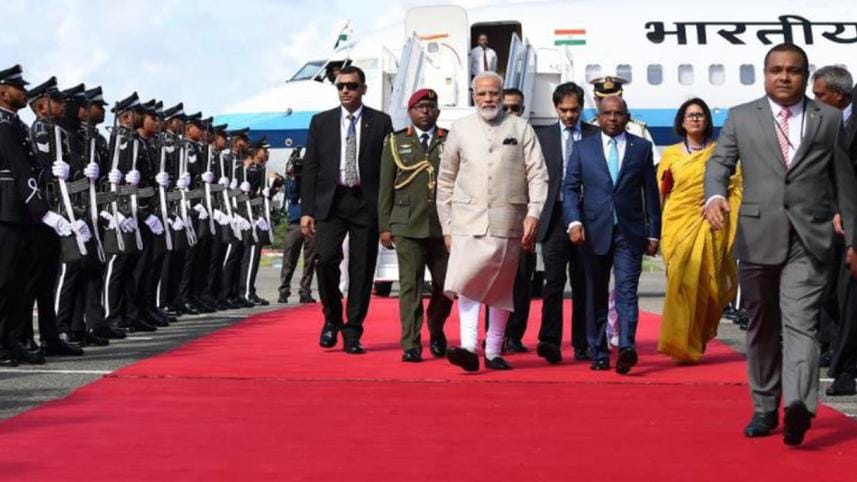Power play in the Indian Ocean

Sri Lanka and Maldives, by their mere locations, are of geostrategic significance in relation to east-west sea trade to and from South Asia. While Sri Lanka lies close to India's south-east, Maldives is located 400km south-west of India. The latter has 26 atolls and over 1,000 islands covering a huge maritime area stretching 750km from north to south. They are significant for China, India and US, who are all jostling for strategic positions in the Indian Ocean.
China has always been wooing Maldives and for the most part has been successful. When Yameen became president in 2013, Maldives became part of China's BRI maritime silk route and swung completely towards China and away from its traditional ties to India. Work on GMR airport in Male was taken away from an Indian company and became one of many contracts awarded to Chinese companies, including a 1.4km bridge linking Male' to the airport in Hulhule island.
The bridge was estimated to have cost over USD 1 billion. The project's critics found it a waste of money as tourists land in Hulhule airport and are immediately flown to their island resorts by sea planes. Also, Yameen broke the law of the land and sold islands and land to China. A free trade agreement was signed with China although Maldives' exports of USD 275,000 was grossly exceeded by imports of USD 342 million from China.
Yameen permitted the Chinese to build a Maritime Observatory on the northern islands. This irked New Delhi as it had a naval military base north of Maldives in Lakshadweep Islands.
New Delhi's concern was not only Maldives' proximity to India and Sri Lanka but that China should not become a dangerous rival across the whole Indian Ocean and control small states previously under India's influence. Yameen's five-year rule from 2013 was authoritarian and corrupt with stringent laws clamping down on political opponents (with Naseed fleeing into exile) and on all forms of free speech and press freedom.
During the 2018 presidential election, the Indian Ocean Archipelago was something of a battleground for regional powers, with China aiming to further diminish India's role in the Maldives.
With Yameen's defeat in the 2018 election by Nasheed's second man Solih of the Maldivian Democratic Party (MDP), the tables have turned in favour of India.
Solih made his first visit to India as president in November 2018 and proclaimed his pro-India policy. Modi visited Maldives after his own re-election. An Indian package of USD 1.4 billion was pledged though with condition that none of it should go to repay China. Six Memoranda of Understanding (MOUs) were signed including regular ferry service from Maldives to Cochin and technical trainings. An Indian added coastal surveillance radar system has been inaugurated. Maldives will support India's non-permanent seat on the UN Security Council and later support India for a permanent seat when the UNSC is expanded.
Sri Lanka like Maldives is of critical importance. Both India and the US are concerned at China's acquisition of Hambantota Port in Sri Lanka followed by Gwador on the Pakistani coast and a military base in Djiboti at the southern entrance to the Red Sea and Suez Canal. China's expansion of its navy poses a potential threat in the Indian Ocean. The US is directly involved because of its long-established air and maritime bases on Diego Garcia in the British Indian territory. This provides vital support to American operations in the Middle East and Afghanistan including Indian Ocean surveillance. Despite President's Trump's trade tension with India, Washington has been trying to develop its partnership with New Delhi to balance that of China and Pakistan.
Recently, US Secretary of State Pompeo on his way to the G20 Summit in Osaka, was forced to abandon a planned visit to Sri Lanka because of protests there over the leaked prospect of a defence deal between Sri Lanka and the US. Opponents fear that it could involve basing US troops in Sri Lanka, subject to US law, plus sale of government land. America's interest to woo Sri Lanka is also indicated by USD 480 million to Sri Lanka from its "Millennium Challenge Corporation", for poverty reduction.
Much will depend on whether the new truce in US-China trade collaboration will bring an easing of relations, perhaps also allowing China to continue to import oil across the Indian Ocean from Iran and Gulf countries. If not, then there may be great risk that the maritime silk road will be an area of tension and potential conflict with Maldives and Sri Lanka exposed on both sides.
The problem of Maldives' debt to Chinese companies could be managed. BRI is facing difficulties. Nepal wants to re-negotiate its huge loan as well as Pakistan. Myanmar has opted out of a highway through its country. The high-speed rail project in Indonesia is fraught with complexities. China is learning from its mistakes.
The Chinese minister of culture stated that it wants to "consolidate their traditional friendship with Maldives to promote BRI to a new impetus."
Even so Solih and Nasheed will need both luck and skill to re-negotiate Chinese loan debts and to regain the islands. Prime Minister Mahathir of Malaysia has shown that it can be done. Solih has nothing like Mahathir's international experience but Beijing is facing difficulties and may wish to avoid confrontation.
Certainly, China will retain its interests in Maldives. They predate Yameen and will continue. But India, the oldest ally of Maldives, has returned with a bang and intends to stay.
Selina Mohsin is a former ambassador.
Follow The Daily Star Opinion on Facebook for the latest opinions, commentaries and analyses by experts and professionals.
To contribute your article or letter to The Daily Star Opinion, see our guidelines for submission.




 For all latest news, follow The Daily Star's Google News channel.
For all latest news, follow The Daily Star's Google News channel.
Comments